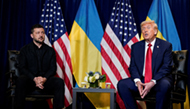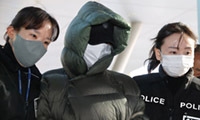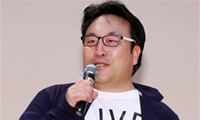Bach and Beethoven, Wired For the Digital Revolution
The Borromeo has forsaken paper musical parts in favor of reading the music, often in the composers’ own writing, on MacBooks nestled on special music stands. A projector attached to a laptop beamed the manuscript onto a screen behind them. “It’s an incredible experience, watching the handwriting of Beethoven as it passes by you,” said Nicholas Kitchen, the group’s first violinist.
The group has replaced tuning devices and metronomes with programs on their laptops, and they record all their concerts.
Nor is the Borromeo alone. Operas and concerts are projected live in movie theaters; music has been written for cellphone ringers ; concert audiences are seeing more multimedia presentations; orchestras use text messages to stay in touch with audiences; YouTube videos are used for auditions. Many orchestras now present programs with sophisticated video images.
Longstanding professional quartets are delicate organisms, in which egos must be balanced, personalities meshed and artistic compromises reached. The push for blanket recording and laptop stands caused tensions. At least one of Borromeo’s members felt pressured. But now, they said, the methods have become second nature.
The Borromeo now sells its performances online at its home-made Web store, livingarchive.org.
The quartet began in the late 1980s at the Curtis Institute of Music in Philadelphia, where Mr. Kitchen; Yeesun Kim, the cellist; and the other two original members were students. Mr. Kitchen and Ms. Kim met there at 16, began playing music together and within a year became a couple. (They are now married and have a 7-year-old son.) The other two current members are the violist Mai Motobuchi and the second violinist Kristopher Tong.
In 2002 Mr. Kitchen began preserving every performance he could, educating himself about microphones, digital recorders and video cameras.
“For audience members it means a lot to have that memory of what they enjoyed so much,” said Ms. Kim, 43.
The quartet now has more than 800 concerts in its archive. The group also uses recordings to teach and to prepare for concerts. Before every concert they run through a program and immediately listen to it.
“Along the way you notice hundreds and hundreds of details that you want to fix,” Mr. Kitchen, 44, said. “Then next time you play it, it’s transformed.”
Members of other prominent quartets expressed admiration for the Borromeo’s use of laptop readers but had no immediate plans to follow suit.
“I don’t see us changing,” Eugene Drucker, a violinist of the Emerson String Quartet, said. But, he said, “Probably more and more groups will be doing this as we go along.”
For the Borromeo the use of laptops grew out of a nontechnological impulse. Mr. Kitchen wanted to read his music from a full score - all four lines of the quartet together ? rather than from his individual part. That made the use of printed scores impractical.
So he scanned scores into his laptop, which he put on a portable stand that came with a foot pedal attachable through a USB. He used the system for rehearsing, and one day his colleagues suggested he take it onstage.
Now the members obtain scores from Web sites offering free editions, like imslp.org, PDF files provided by composers who write music with programs like Sibelius, and their own scanning. The players say having the whole score in front of them is an immense help in playing new works. Complicated passages are immediately comprehensible. Seeing the score as they play also deepens understanding of composers’ intentions. The score “is exactly the direct picture they had in their mind,” Ms. Motobuchi, 35, said.
At first Mr. Kitchen had to push for the system. Mr. Tong - at 29, the youngest and newest member - resisted the most. Seeing the music of his colleagues on the page can detract from the magic of chamber-musicmaking, of communicating through hearing, he said. “For a long time I felt that the more I was seeing, the less I was hearing.”
Mr. Kitchen acknowledged that playing from traditional parts had its advantages. At the same time, he said, “as a group we decided that that sense of confidence, of kind of being empowered by this richer information, was something that made our group perform better.”
By DANIEL J. WAKIN
스마터리빙
more [ 건강]
[ 건강]이제 혈관 건강도 챙기자!
[현대해운]우리 눈에 보이지 않기 때문에 혈관 건강을 챙기는 것은 결코 쉽지 않은데요. 여러분은 혈관 건강을 유지하기 위해 어떤 노력을 하시나요?
 [ 건강]
[ 건강]내 몸이 건강해지는 과일궁합
 [ 라이프]
[ 라이프]벌레야 물럿거라! 천연 해충제 만들기
 [ 건강]
[ 건강]혈압 낮추는데 좋은 식품
[현대해운]혈관 건강은 주로 노화가 진행되면서 지켜야 할 문제라고 인식되어 왔습니다. 최근 생활 패턴과 식생활의 변화로 혈관의 노화 진행이 빨라지고
사람·사람들
more많이 본 기사
- 한인 식당서 이콜라이 집단 식중독
- 관세폭풍 여파… “통관강화속 소포 파손·폐기·배송지연 속출”
- 펠로시 딸도 부시 사촌도…정치인 2세 등 내년 선거 출사표
- 특검, 김건희 ‘매관매직’ 추가기소… ‘尹 뇌물’ 수사는 경찰로
- 中, 美군수기업·경영진 무더기 제재…對대만 무기판매 보복
- 소싯적 ‘치기어린’ 주소 “굿바이”…지메일 주소변경기능 도입
- NYT “美각료·기관 성탄 메시지, 정교분리 원칙 위배 논란”
- 尹내란재판 1월16일 첫선고…특검, 체포방해 등 징역 10년 구형
- 트럼프, ‘성탄절 D-데이’ 나이지리아內 IS 공습 배경은
- 이혁재가 또.. “빌려간 3억원 안 갚아” 사기 혐의로 피소
- 北노동신문 접근 쉬워진다…정부, 일반자료로 재분류키로
- 무면허 건축업자 ‘계약사기’ 집중 단속
- ‘손흥민 감격의 첫 우승’ 올해 축구계 기적 톱8 선정 ‘선수로는 유일’
- 뼈 건강에 커피가 더 좋을까, 차가 더 좋을까?
- 2026년 변경되는 소셜연금
- 효연, 소녀시대 수입 서열 공개 “1위 나 아냐..윤아·태연이 더 벌어”
- 이게 가능해? “여기 뛰는 건.. “ 기안84, 북극서 마지막 극한 마라톤
- 트럼프 관세에…고급 와인 시장도 ‘휘청’
- 8시즌 뛰고 ML 역대 17위 “오타니 GOAT 될 것”, ML 역대 50인 선정
- ‘마약 혐의’ 남양유업 3세 황하나 구속… “증거인멸 우려”
- 쿠팡, 뉴욕증시서 성탄 휴장후 급등출발…장중 10%대↑
- 미성년자와 성관계 체조코치 체포
- VA·MD 7명 생굴 먹고 식중독…22개주 60여명 감염
- 내년 보험료 급등 우려 오바마케어 가입 감소
- 2025 한인사회 10대 뉴스
- 국제은값 폭등에 개인투자자들 銀투자 대거 유입
- 젤렌스키 “28일 트럼프와 종전안 논의…영토·원전 외 90% 완성”
- 2025 미국·세계 10대 뉴스
- 곽도원, 음주운전 3년 만 복귀각..스토리제이컴퍼니 측 “미팅 했지만 계약 단계 아냐”
- 한인 2세, 드라마 ‘런’ 주연 맡아
- ‘손흥민 vs 메시’… 2026 MLS 개막전서 세기의 맞대결 예고
- 엔비디아 200억달러 베팅… 구글 설계자·기술 빼돌려
- ICE 버지니아 구금시설 ‘포화’…수감자 역대최고
- “출생시민권은 사기”⋯ 이민 2세대 공격 초점 맞춘 트럼프
- 초강력 폭풍우 피해 속출… 3명 사망
- ‘18억불’ 잭팟 터졌다 파워볼 1등… 1
- “이재명 부친 야반도주” 주장한 전직… 2
- 조지아 역주행 사고, 한인남편 이어 임신 아내도 사망
- 농심, ‘신라면 분식’ 매장 글로벌 확장
- 물류거점창고에 불체자 8만명 수용 추진
- ‘긴급 렌트비 보조’ LA카운티 접수 시작
- 의심받는 무죄·거래되는 자백 그리고 위장된 진실
- 살림으로 뿌리내리다- 테이크루트 안미정 대표의 요리 이야기 (8)
- 크리스마스 연휴… 오픈한 샤핑몰 ‘북적’
- ‘학자금 상환’ 안하면 임금압류
- 린다 한 “내년 1월17일 별도 한인회연합회 만들겠다”
- [한국춘추] 미국의 힘
- 하원 지일파 의원들, 中의 日강압 규탄하며 행정부 대응 촉구
- KCCEB, 새이름 ‘마루’로 재탄생
- 뉴욕한인회, 이번에 이사장 자리 놓고 내홍 조짐
1/5지식톡

-
 미 육군 사관학교 West Poin…
0
미 육군 사관학교 West Poin…
0https://youtu.be/SxD8cEhNV6Q연락처:wpkapca@gmail.comJohn Choi: 714-716-6414West Point 합격증을 받으셨나요?미 육군사관학교 West Point 학부모 모…
-
 ☝️해외에서도 가능한 한국어 선생님…
0
☝️해외에서도 가능한 한국어 선생님…
0이 영상 하나면 충분합니다!♥️상담신청문의♥️☝️ 문의 폭주로 '선착순 상담'만 진행합니다.☎️ : 02-6213-9094✨카카오톡ID : @GOODEDU77 (@골뱅이 꼭 붙여주셔야합니다…
-
 테슬라 자동차 시트커버 장착
0
테슬라 자동차 시트커버 장착
0테슬라 시트커버, 사놓고 아직 못 씌우셨죠?장착이 생각보다 쉽지 않습니다.20년 경력 전문가에게 맡기세요 — 깔끔하고 딱 맞게 장착해드립니다!장착비용:앞좌석: $40뒷좌석: $60앞·뒷좌석 …
-
 식당용 부탄가스
0
식당용 부탄가스
0식당용 부탄가스 홀세일 합니다 로스앤젤레스 다운타운 픽업 가능 안녕 하세요?강아지 & 고양이 모든 애완동물 / 반려동물 식품 & 모든 애완동물/반려동물 관련 제품들 전문적으로 홀세일/취급하는 회사 입니다 100% …
-
 ACSL 국제 컴퓨터 과학 대회, …
0
ACSL 국제 컴퓨터 과학 대회, …
0웹사이트 : www.eduspot.co.kr 카카오톡 상담하기 : https://pf.kakao.com/_BEQWxb블로그 : https://blog.naver.com/eduspotmain안녕하세요, 에듀스팟입니다…
케이타운 1번가
오피니언

새해 더 중요해지는 노동법 준수

연말연시, 안전하고 차분하게
 캐슬린 파커 워싱턴포스트 칼럼니스트
캐슬린 파커 워싱턴포스트 칼럼니스트 [캐슬린 파커 칼럼] 지미 라이의 마지막 희망
 유경재 나성북부교회 담임목사
유경재 나성북부교회 담임목사 [한국춘추] 미국의 힘
 전병두 서북미수필가협회 회원
전병두 서북미수필가협회 회원 [금요단상] 비자 발급
 박일근 / 한국일보 수석논설위원
박일근 / 한국일보 수석논설위원 [지평선] 스님의 주례사
 신상철 / 고려대 고고미술사학과 교수
신상철 / 고려대 고고미술사학과 교수 [미술 다시보기] 신의 모습을 닮고자 한 예술가
 스티브 강 전 한인민주당협회 회장
스티브 강 전 한인민주당협회 회장 [스티브 강 ‘인사이드 미국’] 2026 중간선거: 트럼프 지지율 하락이 말해주는 것
 김홍일 케이유니콘인베스트먼트 대표
김홍일 케이유니콘인베스트먼트 대표 [기고] 안정의 기준은 어떻게 제도가 되었나
1/3지사별 뉴스

물류거점창고에 불체자 8만명 수용 추진
도널드 트럼프 행정부가 이민자 구금·추방을 효율화하기 위해 전국 물류거점 창고에 8만명 규모의 수용시설 확보를 추진한다고 24일 워싱턴 포스트…
‘학자금 상환’ 안하면 임금압류

“온 세상에 희망·평화의 빛 스며들길”
가자지구와 우크라이나에서의 전쟁, 고립과 불평등으로 세상이 어지러운 가운데 워싱턴 지역 각급 한인교회와 성당들이 성탄절을 맞아 일제히 예배와 …
“연말은 스트레스·새해 결심은 없다”

‘손흥민 vs 메시’ 2026 MLS 개막전서 세기의 맞대결 예고
LA 풋볼클럽(LAFC)가 2026시즌 MLS 정규리그 일정을 공식 발표하며 한인 축구 팬들의 시선을 한몸에 받고 있다. LAFC는 오는 20…
[새해부터 이렇게 달라진다] 최저임금 또 오르고… 유급 병가는 더 확대

오늘 하루 이 창 열지 않음 닫기 





















































.png)


댓글 안에 당신의 성숙함도 담아 주세요.
'오늘의 한마디'는 기사에 대하여 자신의 생각을 말하고 남의 생각을 들으며 서로 다양한 의견을 나누는 공간입니다. 그러나 간혹 불건전한 내용을 올리시는 분들이 계셔서 건전한 인터넷문화 정착을 위해 아래와 같은 운영원칙을 적용합니다.
자체 모니터링을 통해 아래에 해당하는 내용이 포함된 댓글이 발견되면 예고없이 삭제 조치를 하겠습니다.
불건전한 댓글을 올리거나, 이름에 비속어 및 상대방의 불쾌감을 주는 단어를 사용, 유명인 또는 특정 일반인을 사칭하는 경우 이용에 대한 차단 제재를 받을 수 있습니다. 차단될 경우, 일주일간 댓글을 달수 없게 됩니다.
명예훼손, 개인정보 유출, 욕설 등 법률에 위반되는 댓글은 관계 법령에 의거 민형사상 처벌을 받을 수 있으니 이용에 주의를 부탁드립니다.
Close
x